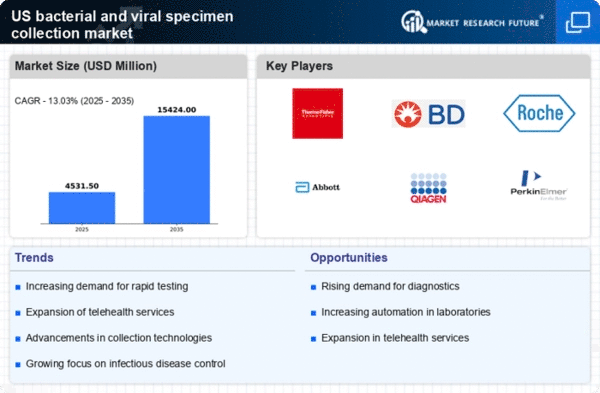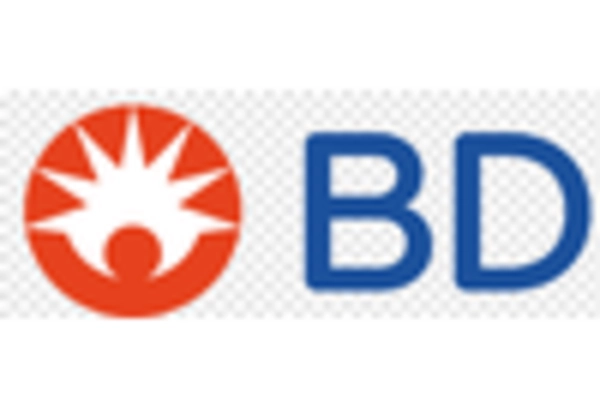Expansion of Telehealth Services
The bacterial viral-specimen-collection market is experiencing a transformation due to the expansion of telehealth services. As healthcare providers increasingly offer remote consultations, the need for efficient specimen collection methods that can be integrated into telehealth platforms is becoming apparent. This shift is likely to enhance patient access to diagnostic testing, particularly in underserved areas. The telehealth market in the US is projected to reach $250 billion by 2025, indicating a substantial opportunity for the bacterial viral-specimen-collection market to align with these services. By developing specimen collection kits that can be used at home or in community settings, companies can cater to the evolving needs of patients and healthcare providers alike. This trend suggests a promising future for the bacterial viral-specimen-collection market as it adapts to the changing landscape of healthcare delivery.
Increased Focus on Infection Control
The bacterial viral-specimen-collection market is influenced by a heightened focus on infection control measures within healthcare settings. Hospitals and clinics are implementing stringent protocols to prevent the spread of infections, which necessitates the use of reliable specimen collection methods. This trend is underscored by the increasing incidence of healthcare-associated infections (HAIs), which affect millions of patients annually. The market is expected to benefit from the growing emphasis on safety and hygiene, as healthcare providers seek to adopt best practices in specimen collection. Investments in training and education for healthcare personnel regarding proper specimen handling are also likely to contribute to market growth. As a result, the bacterial viral-specimen-collection market is poised for expansion as infection control remains a priority in healthcare.
Rising Demand for Diagnostic Testing
The bacterial viral-specimen-collection market is experiencing a notable increase in demand for diagnostic testing. This surge is driven by the growing prevalence of infectious diseases and the need for rapid and accurate diagnosis. According to recent data, the market for diagnostic testing in the US is projected to reach approximately $70 billion by 2026, indicating a robust growth trajectory. As healthcare providers prioritize early detection and treatment, the bacterial viral-specimen-collection market is positioned to benefit significantly. Enhanced testing capabilities, including molecular diagnostics and point-of-care testing, are likely to further propel this demand. Consequently, the market is expected to expand as healthcare systems invest in advanced specimen collection technologies to meet the rising needs of patients and healthcare professionals.
Growing Investment in Healthcare Infrastructure
The bacterial viral-specimen-collection market is benefiting from increased investment in healthcare infrastructure across the US. Government initiatives aimed at enhancing healthcare facilities and expanding laboratory capabilities are driving this growth. For instance, funding for modernizing laboratories and improving specimen collection processes is expected to rise significantly. The US government has allocated billions of dollars to bolster healthcare infrastructure, which is likely to create a favorable environment for the bacterial viral-specimen-collection market. As healthcare facilities upgrade their systems and technologies, the demand for efficient and reliable specimen collection methods is anticipated to grow. This investment trend indicates a positive outlook for the bacterial viral-specimen-collection market as it aligns with broader healthcare improvement efforts.
Technological Innovations in Specimen Collection
Technological advancements are playing a crucial role in shaping the bacterial viral-specimen-collection market. Innovations such as automated specimen collection devices, mobile health applications, and improved storage solutions are enhancing the efficiency and accuracy of specimen collection processes. For instance, the introduction of smart collection devices that integrate with laboratory information systems is streamlining workflows and reducing human error. The market was projected to grow at a CAGR of around 8% over the next five years, driven by these technological innovations. As healthcare facilities increasingly adopt these advanced solutions, the bacterial viral-specimen-collection market is likely to witness significant growth, improving patient outcomes and operational efficiency.
















